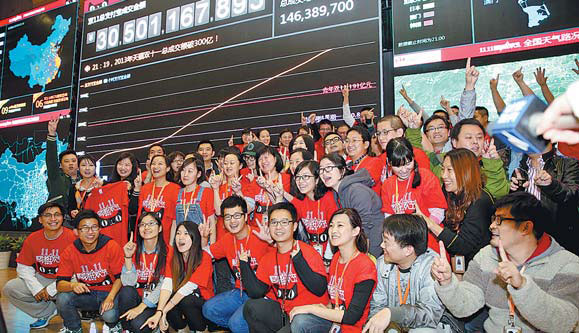Club ensures rosy prospects for ex-Alibaba staff members
Renowned as the "Huangpu Military Academy" of China's Internet industry elite, Alibaba Group Holding Ltd has not only produced legendary achievements but also benefited those who have graduated from this "top school".
The Ex-Alibabaer Club, a non-profit organization composed of former Alibaba employees that focuses on furthering Alibaba's unique vision and culture of cooperation, is such a platform to benefit Alibaba "graduates".
Initiated by former Alibaba employees, the organization has now attracted investors, startup founders, and other former Alibaba executives, serving more than 25,000 former Alibaba employees all over the world.
|
Alibaba employees pose for a group photo when the company saw its online sales exceed 30 billion yuan ($4.8 billion) on Nov 11, 2013. Some of these may have joined the Ex-Alibabaer Club. Provided to China Daily |
Savio Kwan, former Alibaba chief operating officer, John Wu, former chief technology officer, and David Wei, former Alibaba B2B chief executive officer, are among the members of this exclusive club.
The club has organized a number of free online and offline activities for its members. It has also worked with venture capitalists to connect club members with interested investors.
About 80 volunteers work in Hangzhou, Beijing, Shanghai, Guangzhou, Shenzhen and Silicon Valley to help club members find better opportunities. According to Sean Shou, a former member of the founding team of Taobao.com and currently the director of the organization, it is the Ex-Alibabaer Club's mission to serve 100 listed companies founded by club members.
Yang Xuesong joined Alibaba in 2000 as the only fresh graduate from Shanghai admitted to Alibaba. But just one year later, he quit and went back to Shanghai to set up a new company with some other partners.
"I have always dreamed of owning a business of my own. But the first company turned out to be an abortive attempt, mainly because I was too young at the time and not very well prepared," he said.
In 2004, Yang had made enough preparation to set up his own business, and tried to set up his first software company as a part-time worker. Two years later, he started to work full time for his own business and established Shanghai Aresoft Information Technology Co Ltd, a specialist Internet finance technology service provider.
The initial capital of 200,000 yuan ($32,280) was another asset he obtained from Alibaba.
"My goal of operating this company has always been quite clear-cut, which is to serve customers in the first place. As a result, Aresoft achieved an annual sales revenue of nearly 30 million yuan last year with its payroll approaching 100," he said.
Yang joined the Ex-Alibabaer Club at the end of 2013. Recommended by Sean Shou, Yang became the organizer of the club's Shanghai branch in 2014 due to his helpfulness and enthusiasm.
"I set up my own business at an earlier time. Therefore, my personal experiences and connections will be somehow quite helpful to other club members. I really hope that the club will become a channel to provide all kinds of knowledge and help," he said.
"For me, it was also a great privilege to be included in this club. This is not only because I have reconnected with my former colleagues, but also because I have met a large number of very talented people, who have provided me with help in my work and life. This is also in line with the club's motto of 'realizing every member's dream'," he added.
Hu Zhe, 33, left Alibaba in 2010 after working for the company for five years, departing as the corporate affairs department manager. With the dream of establishing his own company, he went to Beijing and set up an Internet company, which he later sold to Alibaba.
But after this deal, he signed a prohibition of business strife contract, which means that he will not be able to work for a similar Internet company any time soon.
Luckily, he started to pick up knowledge about Chinese traditional art and antiques, as his father is a specialist in this area. His interest helped him set up a brand new business providing Chinese lifestyle products and renovating the 144-year-old brand name Jiaoyeshanfang, which dates back to the Qing Dynasty (1644-1911).
In 2011, Hu re-registered this century-old brand name and started to operate it both online and offline.
For the online platform, Hu's company sell all kinds of Chinese-style products such as guqin - a seven-stringed plucked instrument similar to the zither - incense, teacups, writing materials for Chinese calligraphy and even Chinese traditional style furniture.
Jiaoyeshanfang also has a brick-and-mortar store in Hangzhou, where consumers can have a closer look at its products and experience the exquisite layout of the space heavily influenced by traditional Chinese culture. Consumers can get their gifts tailor-made at Jiaoyeshanfang, and can also seek professional help from it in terms of decorating their home or offices.
Starting as a one-man business, Hu now has around 30 employees. The company's clients are all big names including museums such as the Imperial Palace and Suzhou Museum, industry key players such as Hanergy Holding Group Ltd and Alibaba, as well as boutique hotels like Four Seasons and Aman Resorts.
"The ultimate goal is simple and clear, which is to become the leading Chinese-style brand," said Hu.
Hu joined the Ex-Alibabaer Club last year. Soon after Spring Festival, the club recommended candidates appropriate for his company, which Hu thinks is of great help.
"Former Alibaba employees are closely connected, as if there is a bond linking us together. The club serves as a very important platform for us to communicate and exchange ideas," he said.
shijing@chinadaily.com.cn



















